09钻石卡学员第六期英语学习计划(不考数学学员使用)
09钻石卡学员第六期英语学习计划(不考数学学员使用)

09钻石卡学员第六期英语学习计划(不考数学学员使用)
09届钻石卡学员英语第六期学习计划(不考数学学
员使用)
本月是英语基础阶段的最后一月,总体安排是:继续下大力度巩固和积累词汇;背诵英语文章,培养语感,学习各种英语表达;精读文章,培养准确快速的英语阅读能力。
志存高远,脚踏实地,要想考研成功,就必须精度分析每一篇阅读理解的文章,深刻掌握每一个语言知识点,做到每天都有新收获,每日都有小进步,这样才能为以后成绩的迅速提高做好准备。
报名稍晚的学员在安排学习计划的时候,可以根据实际情况,对学习材料合理取舍,适当调整。
本月考试较多,任务量相对较小,个别同学可适当调整。
英语六级学习目标计划
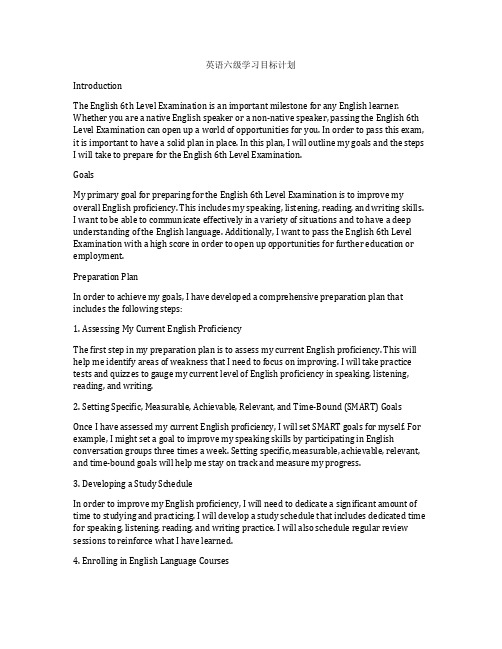
英语六级学习目标计划IntroductionThe English 6th Level Examination is an important milestone for any English learner. Whether you are a native English speaker or a non-native speaker, passing the English 6th Level Examination can open up a world of opportunities for you. In order to pass this exam, it is important to have a solid plan in place. In this plan, I will outline my goals and the steps I will take to prepare for the English 6th Level Examination.GoalsMy primary goal for preparing for the English 6th Level Examination is to improve my overall English proficiency. This includes my speaking, listening, reading, and writing skills.I want to be able to communicate effectively in a variety of situations and to have a deep understanding of the English language. Additionally, I want to pass the English 6th Level Examination with a high score in order to open up opportunities for further education or employment.Preparation PlanIn order to achieve my goals, I have developed a comprehensive preparation plan that includes the following steps:1. Assessing My Current English ProficiencyThe first step in my preparation plan is to assess my current English proficiency. This will help me identify areas of weakness that I need to focus on improving. I will take practice tests and quizzes to gauge my current level of English proficiency in speaking, listening, reading, and writing.2. Setting Specific, Measurable, Achievable, Relevant, and Time-Bound (SMART) GoalsOnce I have assessed my current English proficiency, I will set SMART goals for myself. For example, I might set a goal to improve my speaking skills by participating in English conversation groups three times a week. Setting specific, measurable, achievable, relevant, and time-bound goals will help me stay on track and measure my progress.3. Developing a Study ScheduleIn order to improve my English proficiency, I will need to dedicate a significant amount of time to studying and practicing. I will develop a study schedule that includes dedicated time for speaking, listening, reading, and writing practice. I will also schedule regular review sessions to reinforce what I have learned.4. Enrolling in English Language CoursesI plan to enroll in English language courses to help improve my language skills. This might include courses in grammar, vocabulary, pronunciation, and conversation. I will also look for courses that specifically focus on preparing for the English 6th Level Examination.5. Practicing Speaking and Listening SkillsImproving my speaking and listening skills will be a major focus of my preparation plan. I will participate in English conversation groups, listen to English podcasts and radio programs, and practice speaking with native English speakers whenever possible. I will also make an effort to watch English movies and TV shows without subtitles to improve my listening comprehension.6. Improving Reading and Writing SkillsIn addition to working on my speaking and listening skills, I will also focus on improving my reading and writing skills. I will read a variety of English texts, including newspapers, magazines, and novels, to improve my reading comprehension. I will also practice writing essays and reports to improve my writing skills.7. Using English in Everyday LifeIn order to immerse myself in the English language, I will make an effort to use English in my everyday life as much as possible. This might include switching my phone and computer to English, keeping a journal in English, and thinking and speaking in English whenever possible.8. Taking Practice TestsFinally, I will take practice tests to gauge my progress and identify areas that I need to focus on improving. By taking practice tests, I will become familiar with the format of the English 6th Level Examination and build confidence for the actual exam.ConclusionPreparing for the English 6th Level Examination will require dedication and hard work, but I am confident that with a solid preparation plan in place, I can achieve my goals. By assessing my current English proficiency, setting SMART goals, developing a study schedule, enrolling in English language courses, practicing speaking and listening skills, improving reading and writing skills, using English in everyday life, and taking practice tests, I will be well-prepared to pass the English 6th Level Examination and improve my overall English proficiency. I am committed to following this plan and I am excited to see the progress I will make in the coming months.。
gte学习计划模板
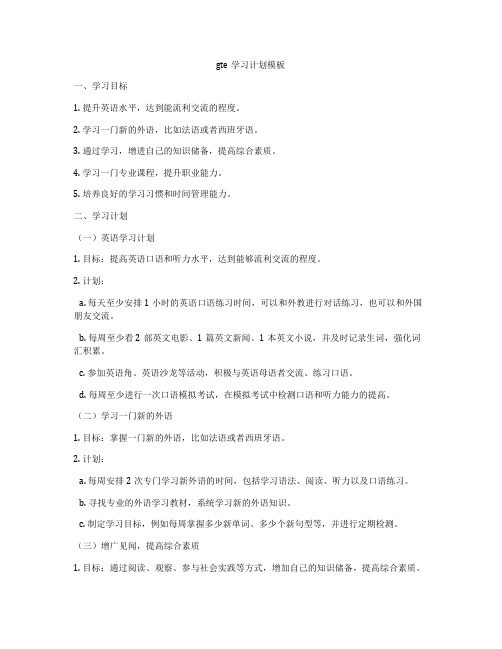
gte学习计划模板一、学习目标1. 提升英语水平,达到能流利交流的程度。
2. 学习一门新的外语,比如法语或者西班牙语。
3. 通过学习,增进自己的知识储备,提高综合素质。
4. 学习一门专业课程,提升职业能力。
5. 培养良好的学习习惯和时间管理能力。
二、学习计划(一)英语学习计划1. 目标:提高英语口语和听力水平,达到能够流利交流的程度。
2. 计划:a. 每天至少安排1小时的英语口语练习时间,可以和外教进行对话练习,也可以和外国朋友交流。
b. 每周至少看2部英文电影、1篇英文新闻、1本英文小说,并及时记录生词,强化词汇积累。
c. 参加英语角、英语沙龙等活动,积极与英语母语者交流、练习口语。
d. 每周至少进行一次口语模拟考试,在模拟考试中检测口语和听力能力的提高。
(二)学习一门新的外语1. 目标:掌握一门新的外语,比如法语或者西班牙语。
2. 计划:a. 每周安排2次专门学习新外语的时间,包括学习语法、阅读、听力以及口语练习。
b. 寻找专业的外语学习教材,系统学习新的外语知识。
c. 制定学习目标,例如每周掌握多少新单词、多少个新句型等,并进行定期检测。
(三)增广见闻,提高综合素质1. 目标:通过阅读、观察、参与社会实践等方式,增加自己的知识储备,提高综合素质。
2. 计划:a. 每周安排专门时间进行文学、历史、地理、艺术等方面的阅读,提高自己的文化素养。
b. 参加一些学术讲座、文化沙龙、博物馆参观等活动,增长见识。
c. 参与一些社会实践活动,积极锻炼自己的能力和经验。
(四)学习专业课程,提升职业能力1. 目标:学习一门专业课程,提升职业能力。
2. 计划:a. 选定一门符合自己职业发展方向的专业课程,比如市场营销、人力资源管理等。
b. 安排每周至少2次专门学习专业课程的时间,包括阅读教材、参加讲座、实践操作等。
c. 制定学习计划和目标,定期进行学习效果评估。
(五)培养良好的学习习惯和时间管理能力1. 目标:培养良好的学习习惯和时间管理能力,确保学习计划的顺利实施。
英语六级学习计划(精选5篇)

英语六级学习计划(精选5篇)第一篇:英语六级学习计划英语六级学习计划如今距六级考试时间仅有100天了,时间紧迫而任务却很繁重。
为能如愿通过六级考试,现将学习计划安排如下:该计划以月为单位,逐步发展,重点突破,严格落实。
第一月以扩大词汇量为主要任务,首先每天早读识记六级单词,并将此作为一个长期目标进行实行,其次要通过海量的阅读来扩大词汇,这也是背单词的一个很好的途径。
为此,每天在饭后,午休前,晚睡前共抽出两个小时的时间来阅读英语短文(图书馆借的书籍)每篇短文至少阅读3遍,第一遍通读了解大意,第二遍扫除障碍,第三遍速读,并且每日阅读量不少于2000字,坚持一个月,并背诵大量的英语模板式句式,为六级写作奠定基础。
第二个月以提高阅读理解为主要任务,每天利用零散的课余时间做阅读理解方面的题,通过第一个月的努力,在词汇量有一定提升的基础上来练习阅读和完形,力求效率。
通过不断的练习将阅读速度提高一个层次。
具体时间安排为除饭后、午睡前、晚睡前的两个小时外,再抽出一个半小时的时间进行突破性阅读,以期将阅读的能力提升。
第三个月则以真题训练为主,从2007-2011共10套试卷,平均三天突破一份试卷,此外将训练听力也纳入一个重点,每天抽出一个半小时时间进行听力训练,同时加强写作训练,没两天写一篇英语作文,在最后的一周里进行真题特训,定时演练,实战模拟。
相信通过三个月的不懈奋战,我定能一举突破六级。
成功=信心+努力+坚持第二篇:英语六级学习计划新学期专题——英语六此次的英语四六级改革,实则对英语六级影响更大,特别是二战三战的同学。
因为一战中已习惯的简单题又换回了极为头疼的选词填空。
那么,让我们来看下名师对新阅读理解的解析。
相信在近期英语四六级改革消息发布后,很多同学发现选词填空又回来了。
简单地讲,本次六级改革就阅读版块而言主要是两大点变化:1.简答题转变为选词填空,即十五选十的题型。
选词填空对语法要求高于简答题,这也就解释了为什么四级传统考法中的选词填空得分是低于六级的简答题的。
个人英语六级学习计划表

个人英语六级学习计划表很多同学都认为六级英语是不可越过的鸿沟,六级真的有这么难考吗?其实只要同学们掌握合适的方法以及制定计划,考六级并不难。
一起来看看我整理的,希望对您有帮助。
篇一早上6点-8点:一日之计在于晨,对一般人来说,疲劳已消除,头脑最清醒,体力亦充沛,是学习的黄金时段早上8点-9点:据试验结果显示,此时人的耐力处于最佳状态,正是接受各种"考验"的好时间可安排难度大的攻坚内容上午9点-11点:试验表明这段时间短期记忆效果很好对"抢记"和马上要考核的东西进行"突击",可事半功倍正午13点-14点:饭后人易疲劳,夏季尤其如此休息调整一下,养精蓄锐,以利再战最好休息,也可听轻音乐但午休切莫过长下午15点-16点:调整后精神又振,试验表明,此时长期记忆效果非常好可合理安排那些需"永久记忆"的东西傍晚17点-18点:试验显示这是完成复杂计算和比较消耗脑力作业的好时间这段时间适宜做复杂计算和费劲作业晚饭后:应根据各人情况妥善安排篇二1、每天保证一定的阅读量2、每天保证一定的听力的时间,至少15分钟的时间,集中注意力,并有意识地去记忆好的句子3、日常思考的时候,尝试用英语思考、想问题以培养语感。
细则听力:1.从specialenglish做起。
每天听写1篇。
一定要坚持。
2.每周看一部discovery系列的纪录片。
初步定在每周6晚。
精读:1.学习新概念英语。
背诵课文。
2.重点领会作者的写作手法,记忆好的结构性的句子和内容性的句子。
词汇:系统背诵六级词汇。
选用星火的6级词汇书。
每周3个wordlist,这样3个月时间可以全部背完。
词汇是重中之重,万万不可轻视!口语:每天坚持对同事说一句以上商务英语,交际、问候的英语不算。
语法:主要还是靠使用中掌握,坚持写英语日记的话,会对语法和词汇都大有好处。
当然有一本语法书也是很重要的。
切忌不可使用文曲星,应该使用纸质英文词典。
英语周六学习计划
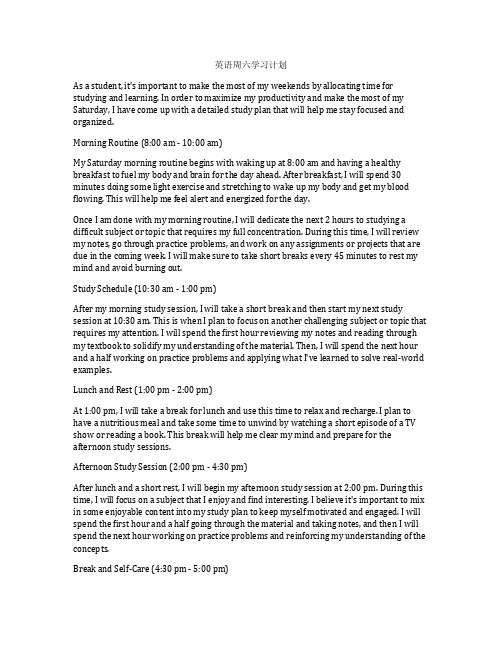
英语周六学习计划As a student, it's important to make the most of my weekends by allocating time for studying and learning. In order to maximize my productivity and make the most of my Saturday, I have come up with a detailed study plan that will help me stay focused and organized.Morning Routine (8:00 am - 10:00 am)My Saturday morning routine begins with waking up at 8:00 am and having a healthy breakfast to fuel my body and brain for the day ahead. After breakfast, I will spend 30 minutes doing some light exercise and stretching to wake up my body and get my blood flowing. This will help me feel alert and energized for the day.Once I am done with my morning routine, I will dedicate the next 2 hours to studying a difficult subject or topic that requires my full concentration. During this time, I will review my notes, go through practice problems, and work on any assignments or projects that are due in the coming week. I will make sure to take short breaks every 45 minutes to rest my mind and avoid burning out.Study Schedule (10:30 am - 1:00 pm)After my morning study session, I will take a short break and then start my next study session at 10:30 am. This is when I plan to focus on another challenging subject or topic that requires my attention. I will spend the first hour reviewing my notes and reading through my textbook to solidify my understanding of the material. Then, I will spend the next hour and a half working on practice problems and applying what I've learned to solve real-world examples.Lunch and Rest (1:00 pm - 2:00 pm)At 1:00 pm, I will take a break for lunch and use this time to relax and recharge. I plan to have a nutritious meal and take some time to unwind by watching a short episode of a TV show or reading a book. This break will help me clear my mind and prepare for the afternoon study sessions.Afternoon Study Session (2:00 pm - 4:30 pm)After lunch and a short rest, I will begin my afternoon study session at 2:00 pm. During this time, I will focus on a subject that I enjoy and find interesting. I believe it's important to mix in some enjoyable content into my study plan to keep myself motivated and engaged. I will spend the first hour and a half going through the material and taking notes, and then I will spend the next hour working on practice problems and reinforcing my understanding of the concepts.Break and Self-Care (4:30 pm - 5:00 pm)At 4:30 pm, I will take a short break to stretch, go for a quick walk, or practice some mindfulness exercises to clear my mind and rejuvenate my spirit. I will also use this time to grab a healthy snack and hydrate myself to stay focused and energized for the evening study session.Evening Study Session (5:00 pm - 7:00 pm)For my evening study session, I will revisit the subjects that require more attention and review any difficult concepts or topics that I struggled with earlier in the day. I will dedicate this time to focusing on any additional assignments, projects, or readings that I need to complete before the end of the weekend. This will give me a chance to wrap up any loose ends and ensure that I am prepared for the upcoming week.Dinner and Relaxation (7:00 pm - 8:30 pm)After a full day of studying, I will take a well-deserved break to have dinner and unwind. I plan to have a balanced, healthy meal and take some time to relax and enjoy the evening. Whether it's spending time with my family, reading a book, or watching a movie, I will use this time to rejuvenate and recharge for the week ahead.Review and Reflection (8:30 pm - 9:30 pm)Before wrapping up my Saturday study plan, I will take some time to reflect on the day's accomplishments and review the important concepts and topics that I covered. I will spend 30 minutes going through my notes and highlighting key points to reinforce my understanding. This will also help me identify any areas that may require further review or practice in the future.Relaxation and Bedtime (9:30 pm - 10:00 pm)Finally, I will dedicate the last 30 minutes of my Saturday to relaxation and winding down for bedtime. I will use this time to practice some relaxation techniques, such as deep breathing or meditation, to help calm my mind and prepare for a restful night's sleep.In conclusion, my Saturday study plan is designed to help me make the most of my weekend by dedicating focused time to learning and reviewing important concepts. By following this schedule, I hope to stay organized, motivated, and productive, and ultimately achieve my academic goals. I believe that with dedication and discipline, I can make the most of my Saturdays and set myself up for success in my studies.。
a6手帐学习计划模板
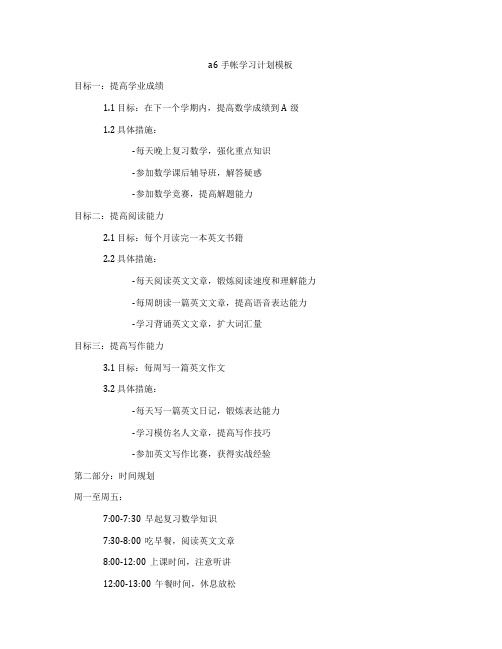
a6手帐学习计划模板目标一:提高学业成绩1.1 目标:在下一个学期内,提高数学成绩到A级1.2 具体措施:-每天晚上复习数学,强化重点知识-参加数学课后辅导班,解答疑惑-参加数学竞赛,提高解题能力目标二:提高阅读能力2.1 目标:每个月读完一本英文书籍2.2 具体措施:-每天阅读英文文章,锻炼阅读速度和理解能力-每周朗读一篇英文文章,提高语音表达能力-学习背诵英文文章,扩大词汇量目标三:提高写作能力3.1 目标:每周写一篇英文作文3.2 具体措施:-每天写一篇英文日记,锻炼表达能力-学习模仿名人文章,提高写作技巧-参加英文写作比赛,获得实战经验第二部分:时间规划周一至周五:7:00-7:30 早起复习数学知识7:30-8:00 吃早餐,阅读英文文章8:00-12:00 上课时间,注意听讲12:00-13:00 午餐时间,休息放松13:00-15:00 完成作业,准备课堂参与15:00-17:00 参加数学辅导班,提高解题能力17:00-18:00 运动锻炼,保持身体健康18:00-19:00 晚餐时间,放松心情19:00-20:30 复习数学知识,做练习题20:30-21:30 阅读英文书籍,扩大阅读能力21:30-22:00 准备明天的学习计划周末:9:00-10:00 早起阅读报纸,了解国际时事10:00-12:00 写作实践,完成英文作文12:00-13:00 午餐时间,休息放松13:00-15:00 参加英文写作比赛,积累经验15:00-17:00 课外活动,放松心情17:00-18:00 回顾一周的学习成果,总结经验18:00-19:00 晚餐时间,放松心情19:00-20:30 复习数学知识,做练习题20:30-21:30 阅读英文书籍,扩大阅读能力21:30-22:00 准备下周的学习计划第三部分:记录方式-使用A6手账记录每日学习计划和成果-在手账上安排每日时间表和重点任务-保持每日学习和生活的记录,反馈自己的学习状态-定期对比过去的学习记录,分析自己的学习习惯和偏好-在手账上画出学习目标的实现路径,鼓励自己不断奋斗第四部分:监督和调整-每周对照学习计划,检查完成情况-根据实际学习情况进行调整,完善学习计划-定期与家长和老师交流学习情况,获取更多建议和帮助-保持积极乐观的心态,鼓励自己在学习路上持续前行-养成每日总结的习惯,及时发现问题并加以改正总结:通过制定A6手账学习计划,我将能够更加有序地安排学习时间,有效提高学习效率。
英语6级学习计划

英语6级学习计划Sixth Level English Study PlanIntroductionThe TOEFL (Test of English as a Foreign Language) is an important language proficiency test for non-native English speakers who are looking to study or work in an English-speaking country. It consists of four sections: reading, writing, listening, and speaking. The sixth level English (also known as C1 level) is considered an advanced level of English proficiency and it requires a high level of proficiency across all four sections.As someone who is aiming to achieve a sixth level English proficiency, it is important to have a structured study plan in place. This study plan will help to ensure that you are covering all aspects of the English language and making progress towards your goals. In this study plan, we will outline the different areas of study and provide specific strategies and resources for each area.ReadingThe reading section of the TOEFL exam requires you to read and understand academic texts. This section will test your ability to understand and analyze complex passages. To improve your reading skills, it is important to engage with a wide variety of texts and to practice regularly.Strategy:- Read widely: Try to read a variety of texts, including newspapers, magazines, academic articles, and novels. This will help you to become familiar with different writing styles and vocabulary.- Practice skimming and scanning: Skimming and scanning are important skills for this section. Skimming involves quickly reading a text to get a general idea of the content, while scanning involves looking for specific information within a text.- Take notes: As you read, take notes on the main ideas, key points, and any unfamiliar vocabulary. This will help you to engage more deeply with the text and improve your retention of information. Resources:- Academic journals: Focus on reading academic journals in your field of interest. This will help you to become familiar with the type of texts you will encounter in the TOEFL exam.- Novels: Reading novels in English can help to improve your reading comprehension and vocabulary. Choose novels that are at an appropriate level for your current proficiency.WritingThe writing section of the TOEFL exam requires you to write a well-structured essay in response to a prompt. This section will test your ability to articulate and support complex ideas in writing. To improve your writing skills, it is important to practice writing regularly and to seek feedback on your work.Strategy:- Practice writing essays: Set aside time each week to write essays on a variety of topics. This will help you to develop your ability to articulate and support complex ideas in writing.- Seek feedback: Ask a teacher, tutor, or language exchange partner to provide feedback on your writing. This will help you to identify areas for improvement and to develop your writing skills.- Study grammar and vocabulary: Improving your grammar and vocabulary will help you to express yourself more clearly and effectively in writing. Make sure to study and practice these aspects of the English language regularly.Resources:- Writing prompts: There are many websites and books that provide writing prompts for the TOEFL exam. Practice writing essays in response to these prompts to prepare for the exam.- Grammar and vocabulary resources: There are many online resources and textbooks available to help you improve your grammar and vocabulary. Choose resources that are appropriate for your current proficiency level.ListeningThe listening section of the TOEFL exam requires you to listen to lectures and conversations and to answer questions based on the content. This section will test your ability to understand main ideas, relevant details, and the purpose of what is being said. To improve your listening skills, it is important to engage with a variety of spoken English and to practice listening regularly.Strategy:- Listen to a variety of spoken English: This could include podcasts, TED talks, lectures, and conversations. Exposing yourself to avariety of spoken English will help you to become familiar with different accents, speaking styles, and topics.- Take notes while listening: As you listen, take notes on the main ideas, key points, and any unfamiliar vocabulary. This will help you to engage more deeply with the content and improve your retention of information.- Practice listening for specific information: In the TOEFL exam, you will be required to listen for specific information. Practice this skill by listening to recordings and then summarizing the main points or answering questions based on the content.Resources:- TED talks: TED talks cover a wide range of topics and provide an opportunity to listen to engaging and informative spoken English.- English podcasts: There are many podcasts available for English language learners that cover a variety of topics and difficulty levels. Choose podcasts that are appropriate for your current proficiency level.SpeakingThe speaking section of the TOEFL exam requires you to express and support your ideas in spoken English. This section will test your ability to communicate effectively in a variety of academic situations. To improve your speaking skills, it is important to practice speaking regularly and to seek feedback on your spoken English.Strategy:- Practice speaking regularly: Set aside time each week to practice speaking English. This could involve having conversations with a language exchange partner, giving presentations, or participating in speaking clubs.- Seek feedback: Ask a teacher, tutor, or language exchange partner to provide feedback on your spoken English. This will help you to identify areas for improvement and to develop your speaking skills.- Focus on pronunciation: Improving your pronunciation will help you to communicate more effectively in spoken English. Make sure to practice and study pronunciation regularly. Resources:- Speaking clubs: Many language schools and community organizations offer speaking clubs where you can practice speaking English with other learners.- Language exchange partners: Finding a language exchange partner who is a native English speaker can provide valuable opportunities to practice and improve your spoken English. ConclusionAchieving a sixth level English proficiency is a challenging but attainable goal. By following a structured study plan that incorporates regular practice, feedback, and engagement with a variety of English language resources, you can make steady progress towards this goal. Remember to be patient with yourself and to celebrate your progress along the way. Good luck with your studies!。
英语六级学习学习计划
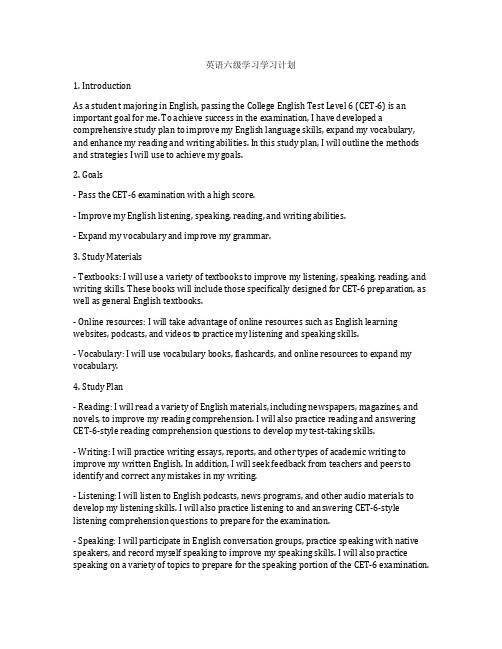
英语六级学习学习计划1. IntroductionAs a student majoring in English, passing the College English Test Level 6 (CET-6) is an important goal for me. To achieve success in the examination, I have developed a comprehensive study plan to improve my English language skills, expand my vocabulary, and enhance my reading and writing abilities. In this study plan, I will outline the methods and strategies I will use to achieve my goals.2. Goals- Pass the CET-6 examination with a high score.- Improve my English listening, speaking, reading, and writing abilities.- Expand my vocabulary and improve my grammar.3. Study Materials- Textbooks: I will use a variety of textbooks to improve my listening, speaking, reading, and writing skills. These books will include those specifically designed for CET-6 preparation, as well as general English textbooks.- Online resources: I will take advantage of online resources such as English learning websites, podcasts, and videos to practice my listening and speaking skills.- Vocabulary: I will use vocabulary books, flashcards, and online resources to expand my vocabulary.4. Study Plan- Reading: I will read a variety of English materials, including newspapers, magazines, and novels, to improve my reading comprehension. I will also practice reading and answering CET-6-style reading comprehension questions to develop my test-taking skills.- Writing: I will practice writing essays, reports, and other types of academic writing to improve my written English. In addition, I will seek feedback from teachers and peers to identify and correct any mistakes in my writing.- Listening: I will listen to English podcasts, news programs, and other audio materials to develop my listening skills. I will also practice listening to and answering CET-6-style listening comprehension questions to prepare for the examination.- Speaking: I will participate in English conversation groups, practice speaking with native speakers, and record myself speaking to improve my speaking skills. I will also practice speaking on a variety of topics to prepare for the speaking portion of the CET-6 examination.- Vocabulary: I will learn new words and phrases every day, and review them regularly to expand my vocabulary. I will also use vocabulary exercises and tests to assess my progress and identify areas for improvement.5. Study Schedule- Monday to Friday: I will dedicate 2 hours each day to English study. This time will be divided between reading, writing, listening, speaking, and vocabulary practice.- Saturday: I will review the materials I have studied during the week and take practice tests to measure my progress.- Sunday: I will take a break from English study to relax and recharge for the upcoming week.6. Evaluation and Revision- At the end of each month, I will evaluate my progress and adjust my study plan as needed.I will seek feedback from teachers and peers to identify areas for improvement and make appropriate changes to my study plan.- In the final month before the CET-6 examination, I will focus on reviewing all of the materials I have studied, taking practice tests, and seeking feedback from teachers and peers to ensure that I am fully prepared for the examination.7. ConclusionIn conclusion, passing the CET-6 examination is an important goal for me, and I am committed to achieving success through diligent study and hard work. By following the study plan outlined above, I am confident that I will improve my English language skills, expand my vocabulary, and perform well on the CET-6 examination. I am excited to begin my English study journey and look forward to the progress and success that lies ahead.。
英语六级下册学习计划
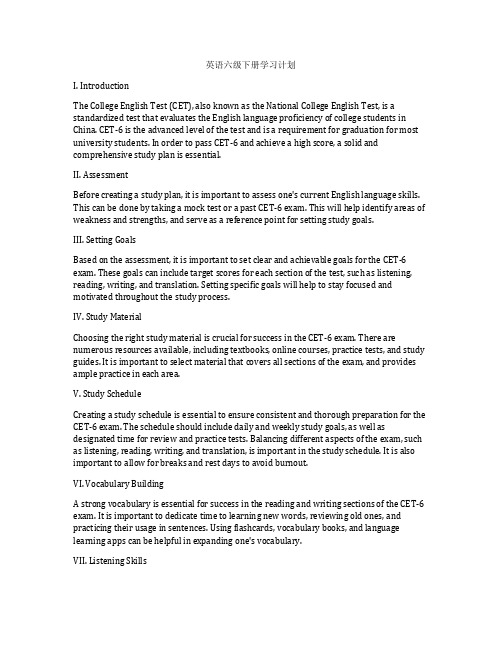
英语六级下册学习计划I. IntroductionThe College English Test (CET), also known as the National College English Test, is a standardized test that evaluates the English language proficiency of college students in China. CET-6 is the advanced level of the test and is a requirement for graduation for most university students. In order to pass CET-6 and achieve a high score, a solid and comprehensive study plan is essential.II. AssessmentBefore creating a study plan, it is important to assess one's current English language skills. This can be done by taking a mock test or a past CET-6 exam. This will help identify areas of weakness and strengths, and serve as a reference point for setting study goals.III. Setting GoalsBased on the assessment, it is important to set clear and achievable goals for the CET-6 exam. These goals can include target scores for each section of the test, such as listening, reading, writing, and translation. Setting specific goals will help to stay focused and motivated throughout the study process.IV. Study MaterialChoosing the right study material is crucial for success in the CET-6 exam. There are numerous resources available, including textbooks, online courses, practice tests, and study guides. It is important to select material that covers all sections of the exam, and provides ample practice in each area.V. Study ScheduleCreating a study schedule is essential to ensure consistent and thorough preparation for the CET-6 exam. The schedule should include daily and weekly study goals, as well as designated time for review and practice tests. Balancing different aspects of the exam, such as listening, reading, writing, and translation, is important in the study schedule. It is also important to allow for breaks and rest days to avoid burnout.VI. Vocabulary BuildingA strong vocabulary is essential for success in the reading and writing sections of the CET-6 exam. It is important to dedicate time to learning new words, reviewing old ones, and practicing their usage in sentences. Using flashcards, vocabulary books, and language learning apps can be helpful in expanding one's vocabulary.VII. Listening SkillsThe listening section of the CET-6 exam requires the ability to understand spoken English in various contexts. To improve listening skills, it is important to listen to a wide range of English audio material, such as podcasts, news programs, and TV shows. It is also important to practice listening to academic lectures and discussions, as these are common in the CET-6 exam.VIII. Reading ComprehensionThe reading section of the CET-6 exam requires the ability to understand and analyze written English passages. To improve reading comprehension, it is important to read a variety of texts, including newspapers, magazines, academic articles, and literature. It is important to practice skimming and scanning techniques to improve reading speed and efficiency.IX. Writing SkillsThe writing section of the CET-6 exam requires the ability to write well-structured essays and articles in English. To improve writing skills, it is important to practice writing regularly, focusing on different types of essays, such as argumentative, descriptive, and narrative. It is also important to pay attention to grammar, punctuation, and vocabulary usage in writing.X. Translation SkillsThe translation section of the CET-6 exam requires the ability to accurately translate passages between Chinese and English. To improve translation skills, it is important to practice translating a variety of texts, such as news articles, literary works, and academic papers. It is also important to pay attention to idiomatic expressions and cultural nuances in translation.XI. Review and PracticeRegular review and practice are essential to reinforce learning and improve performance in the CET-6 exam. It is important to take regular practice tests to track progress and identify areas for improvement. It is also important to review and revise previous study material to ensure retention of knowledge.XII. ConclusionA comprehensive study plan is essential for success in the CET-6 exam. By setting clear goals, choosing the right study material, and creating a consistent study schedule, one can improve their English language skills and achieve a high score in the CET-6 exam. With dedication and perseverance, success in the CET-6 exam is within reach.。
写英语四六级学习计划
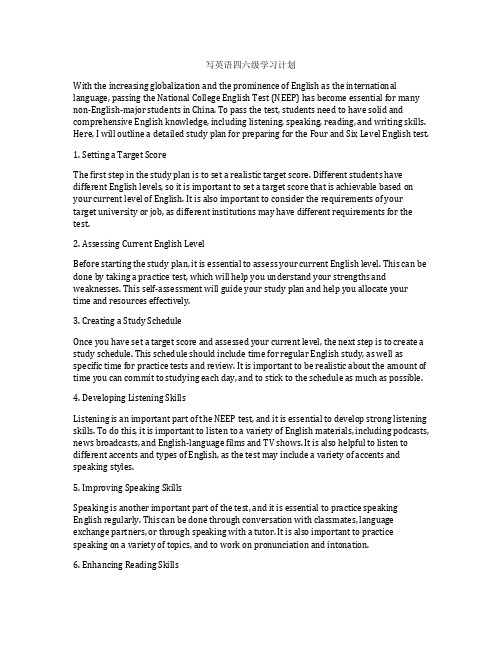
写英语四六级学习计划With the increasing globalization and the prominence of English as the international language, passing the National College English Test (NEEP) has become essential for many non-English-major students in China. To pass the test, students need to have solid and comprehensive English knowledge, including listening, speaking, reading, and writing skills. Here, I will outline a detailed study plan for preparing for the Four and Six Level English test.1. Setting a Target ScoreThe first step in the study plan is to set a realistic target score. Different students have different English levels, so it is important to set a target score that is achievable based on your current level of English. It is also important to consider the requirements of your target university or job, as different institutions may have different requirements for the test.2. Assessing Current English LevelBefore starting the study plan, it is essential to assess your current English level. This can be done by taking a practice test, which will help you understand your strengths and weaknesses. This self-assessment will guide your study plan and help you allocate your time and resources effectively.3. Creating a Study ScheduleOnce you have set a target score and assessed your current level, the next step is to create a study schedule. This schedule should include time for regular English study, as well as specific time for practice tests and review. It is important to be realistic about the amount of time you can commit to studying each day, and to stick to the schedule as much as possible.4. Developing Listening SkillsListening is an important part of the NEEP test, and it is essential to develop strong listening skills. To do this, it is important to listen to a variety of English materials, including podcasts, news broadcasts, and English-language films and TV shows. It is also helpful to listen to different accents and types of English, as the test may include a variety of accents and speaking styles.5. Improving Speaking SkillsSpeaking is another important part of the test, and it is essential to practice speaking English regularly. This can be done through conversation with classmates, language exchange partners, or through speaking with a tutor. It is also important to practice speaking on a variety of topics, and to work on pronunciation and intonation.6. Enhancing Reading SkillsReading is a key component of the NEEP test, and it is important to develop strong reading skills. This can be done through reading a variety of English materials, including newspapers, magazines, and novels. It is also important to practice reading quickly and accurately, as the test includes a timed reading section.7. Strengthening Writing SkillsWriting is another important part of the test, and it is essential to develop strong writing skills. This can be done through regular writing practice, including writing essays, letters, and reports. It is also important to work on grammar and vocabulary, as well as structuring and organizing your writing.8. Using Study MaterialsThere are many study materials available for the NEEP test, including textbooks, practice tests, and online resources. It is important to use a variety of study materials, as this will help you develop a well-rounded understanding of English and prepare you for the variety of questions on the test.9. Taking Practice TestsPractice tests are an essential part of preparing for the NEEP test, as they help you understand the format of the test and identify areas for improvement. It is important to take practice tests regularly, and to review your answers carefully to understand your mistakes and learn from them.10. Reviewing and ReflectingFinally, it is important to regularly review your progress and reflect on your study plan. This can be done by taking regular practice tests and reviewing your scores, as well as by reflecting on your strengths and weaknesses. It is also important to adjust your study plan as needed, based on your progress and areas for improvement.In conclusion, preparing for the NEEP test requires a comprehensive and well-structured study plan. By setting a target score, assessing your current level, and creating a study schedule, you can effectively develop your listening, speaking, reading, and writing skills. With regular practice and review, you will be well-prepared to achieve success on the NEEP test.。
六级英语培训学习计划

六级英语培训学习计划IntroductionThe Sixth Level English Training Study Plan is designed to help students improve their English language skills, with a focus on reading, writing, listening, and speaking. This study plan is suitable for students who have a basic understanding of English and want to enhance their proficiency to a higher level. The study plan includes a variety of activities and resources to help students achieve their goals.GoalsThe primary goal of the Sixth Level English Training Study Plan is to improve the overall English proficiency of the students. This includes enhancing their reading, writing, listening, and speaking skills, as well as expanding their vocabulary and grammar knowledge. By the end of the study plan, students should be able to communicate effectively in English, understand complex texts, and express themselves confidently in both written and spoken forms.Study Plan OverviewThe study plan is divided into three main sections: reading, writing, and listening/speaking. Each section includes a variety of activities and resources to help students improve their English language skills. The study plan also incorporates regular practice and assessment to measure the progress of the students.ReadingThe reading section of the study plan focuses on improving students' reading comprehension and vocabulary. Students will be exposed to a variety of texts, including articles, essays, and short stories. They will also practice analyzing and interpreting complex texts, as well as identifying main ideas and supporting details.Activities:1. Students will read a variety of texts and practice summarizing the main ideas and supporting details.2. Students will expand their vocabulary by learning new words and phrases through reading and context clues.3. Students will practice reading comprehension through exercises and quizzes. Resources:1. Reading passages and articles on various topics.2. Vocabulary building exercises and quizzes.3. Reading comprehension exercises and assessments.WritingThe writing section of the study plan focuses on improving students' writing skills, including grammar, sentence structure, and organization. Students will practice writing essays, reports, and other types of formal writing, as well as creative writing to enhance their expressive abilities.Activities:1. Students will practice writing essays on various topics, including argumentative, descriptive, and narrative essays.2. Students will learn grammar and sentence structure through exercises and correction practice.3. Students will practice editing and revising their own writing to improve clarity and coherence.Resources:1. Writing prompts and essay topics.2. Grammar and sentence structure exercises and quizzes.3. Peer review and self-editing exercises.Listening/SpeakingThe listening/speaking section of the study plan focuses on improving students' listening and speaking skills, including comprehension, pronunciation, and conversational ability. Students will practice listening to and understanding different accents and speaking in a variety of situations.Activities:1. Students will practice listening to audio recordings and videos, and complete comprehension exercises.2. Students will practice speaking and pronunciation through dialogue and role-playing activities.3. Students will engage in conversations and discussions on various topics to improve their conversational skills.Resources:1. Audio recordings and videos with different accents and speech patterns.2. Pronunciation and speaking exercises and drills.3. Conversational practice and discussion topics.Practice and AssessmentThroughout the study plan, students will engage in regular practice and assessment to measure their progress and identify areas for improvement. This may include regular quizzes, tests, and writing assignments, as well as self-assessment and peer review activities.ConclusionThe Sixth Level English Training Study Plan is designed to help students improve their English language skills in reading, writing, listening, and speaking. By engaging in a variety of activities and resources, students will build their vocabulary, grammar knowledge, and overall proficiency in English. The study plan also incorporates regular practice and assessment to measure the progress of the students and identify areas for improvement. With dedication and commitment, students can achieve their goals and become confident and effective communicators in English.。
剑桥英语学习计划
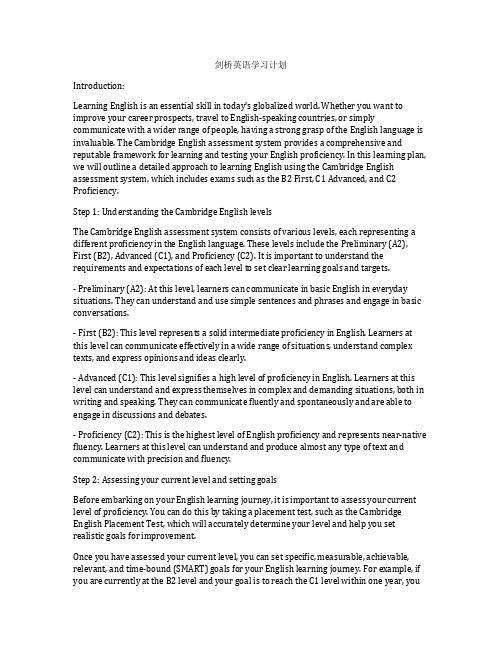
剑桥英语学习计划Introduction:Learning English is an essential skill in today's globalized world. Whether you want to improve your career prospects, travel to English-speaking countries, or simply communicate with a wider range of people, having a strong grasp of the English language is invaluable. The Cambridge English assessment system provides a comprehensive and reputable framework for learning and testing your English proficiency. In this learning plan, we will outline a detailed approach to learning English using the Cambridge English assessment system, which includes exams such as the B2 First, C1 Advanced, and C2 Proficiency.Step 1: Understanding the Cambridge English levelsThe Cambridge English assessment system consists of various levels, each representing a different proficiency in the English language. These levels include the Preliminary (A2), First (B2), Advanced (C1), and Proficiency (C2). It is important to understand the requirements and expectations of each level to set clear learning goals and targets.- Preliminary (A2): At this level, learners can communicate in basic English in everyday situations. They can understand and use simple sentences and phrases and engage in basic conversations.- First (B2): This level represents a solid intermediate proficiency in English. Learners at this level can communicate effectively in a wide range of situations, understand complex texts, and express opinions and ideas clearly.- Advanced (C1): This level signifies a high level of proficiency in English. Learners at this level can understand and express themselves in complex and demanding situations, both in writing and speaking. They can communicate fluently and spontaneously and are able to engage in discussions and debates.- Proficiency (C2): This is the highest level of English proficiency and represents near-native fluency. Learners at this level can understand and produce almost any type of text and communicate with precision and fluency.Step 2: Assessing your current level and setting goalsBefore embarking on your English learning journey, it is important to assess your current level of proficiency. You can do this by taking a placement test, such as the Cambridge English Placement Test, which will accurately determine your level and help you set realistic goals for improvement.Once you have assessed your current level, you can set specific, measurable, achievable, relevant, and time-bound (SMART) goals for your English learning journey. For example, if you are currently at the B2 level and your goal is to reach the C1 level within one year, youcan break down this goal into smaller, manageable targets, such as improving your speaking and writing skills, expanding your vocabulary, and enhancing your grammar knowledge. Step 3: Creating a study planA well-structured study plan is essential for success in learning English. Your study plan should include a combination of formal study, self-study, and practice to ensure comprehensive and well-rounded language development.- Formal study: Enrolling in a Cambridge English preparation course or working with a qualified English language teacher can provide you with the necessary guidance and support to improve your English skills. These courses are designed to prepare you for the specific Cambridge English exams and will focus on all areas of language learning, including reading, writing, listening, speaking, grammar, and vocabulary.- Self-study: In addition to formal study, it is important to dedicate time to self-study. This can include activities such as reading English books and articles, watching English-language movies and TV shows, listening to English podcasts and music, and engaging in online language learning platforms. Self-study will help you to reinforce and expand on what you have learned in formal study and expose you to real-life language use.- Practice: Regular practice is essential for improving your English skills. This can include speaking with native English speakers, participating in language exchange programs, writing essays and reports, and taking practice exams. Practice will help you to apply the knowledge and skills you have acquired and gain confidence in using English in various contexts.Step 4: Monitoring your progressMonitoring your progress is crucial to ensure that you are on track to achieve your learning goals. Regular assessments and feedback from your teachers or tutors can help you identify areas for improvement and adjust your study plan accordingly. It is also important to track your language development through self-assessment and reflection. Keep a journal or diary to record your language learning experiences, challenges, and accomplishments, and review them regularly to see how far you have come.Step 5: Taking the Cambridge English examsThe culmination of your English learning journey with the Cambridge English assessment system is taking the formal exams. These exams are internationally recognized and provide a reliable measure of your English language proficiency. The B2 First, C1 Advanced, and C2 Proficiency exams assess all areas of language learning, including reading, writing, listening, speaking, grammar, and vocabulary, and are designed to test your ability to communicate effectively in real-life situations.Before taking the exams, it is important to familiarize yourself with the exam format, practice past papers, and receive feedback on your performance. Additionally, it is essentialto develop effective test-taking strategies, such as time management, careful reading and comprehension, and clear and concise communication in the speaking and writing tasks. Conclusion:The Cambridge English assessment system provides a comprehensive and reputable framework for learning and testing your English proficiency. By following a well-structured learning plan, setting SMART goals, and dedicating time to formal study, self-study, and practice, you can improve your English skills and achieve success in the B2 First, C1 Advanced, and C2 Proficiency exams. Remember that learning a language is a journey, and consistent effort and dedication will lead to rewarding outcomes in your English language proficiency. Good luck on your English learning journey with the Cambridge English assessment system!。
用甘特图做英语六级考试学习计划
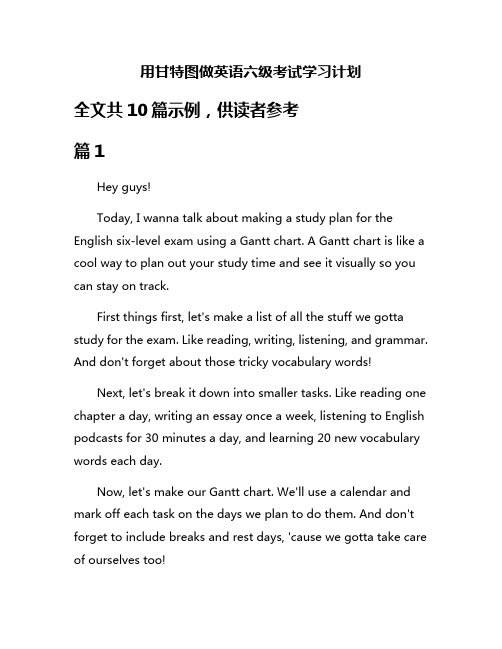
用甘特图做英语六级考试学习计划全文共10篇示例,供读者参考篇1Hey guys!Today, I wanna talk about making a study plan for the English six-level exam using a Gantt chart. A Gantt chart is like a cool way to plan out your study time and see it visually so you can stay on track.First things first, let's make a list of all the stuff we gotta study for the exam. Like reading, writing, listening, and grammar. And don't forget about those tricky vocabulary words!Next, let's break it down into smaller tasks. Like reading one chapter a day, writing an essay once a week, listening to English podcasts for 30 minutes a day, and learning 20 new vocabulary words each day.Now, let's make our Gantt chart. We'll use a calendar and mark off each task on the days we plan to do them. And don't forget to include breaks and rest days, 'cause we gotta take care of ourselves too!Once our Gantt chart is all set up, we can start studying and checking off tasks as we go. It's like a little game where we get to see our progress and feel good about all the hard work we're putting in.So, let's get started on our English six-level exam study plan with a Gantt chart and show that test who's boss! Let's do this, guys!Good luck!篇2Hey guys!I want to tell you about how I made a study plan for my English CET-6 exam using a Gantt chart. A Gantt chart is like a timeline that helps you plan and track progress on your tasks. It's super cool! Here's how I did it:First, I listed all the sections of the CET-6 exam, like listening, reading, writing, and speaking. Then, I set a goal for each section, like improving my listening skills by listening to English podcasts for 30 minutes every day.Next, I divided each section into smaller tasks and assigned deadlines for each task. For example, I gave myself one week to finish a practice listening test and analyze my mistakes.After that, I created a Gantt chart on my computer or even just on paper by drawing a timeline with all the tasks and deadlines. I color-coded each task to make it easier to see what I needed to work on each day.Every day, I checked my Gantt chart to see what tasks I needed to do and marked off the ones I completed. It really helped me stay focused and on track with my study plan.Finally, I reviewed my progress at the end of each week and adjusted my plan if needed. It was so satisfying to see how much I improved over time!So, if you're preparing for a big exam like the CET-6, try making a study plan with a Gantt chart. It's fun, easy, and really effective. Good luck with your studies!篇3Hey guys,I'm gonna tell you about my super cool study plan for the English six-level exam using a Gantt chart! It's gonna be so awesome and organized.First things first, I'm gonna break down my study plan into different sections like reading, listening, writing, and speaking. Each section will have its own tasks and goals.For reading, I'm gonna spend one hour every day reading English books and articles. I'll make sure to understand and take notes on any new vocabulary I come across. I wanna get better at reading comprehension, so I'm gonna practice with sample reading passages.Next up is listening. I'm gonna listen to English podcasts and watch movies in English for 30 minutes every day. I'll also do some listening exercises to improve my listening skills. I wanna be able to understand different accents and dialects.Writing is also important, so I'm gonna write at least one essay every week. I'll ask my teacher or a friend to check my writing for any mistakes. I wanna work on my grammar and vocabulary, so I'll do some writing exercises too.Lastly, for speaking, I'll practice speaking English with a buddy for 20 minutes every day. We'll have conversations andpractice pronunciation. I wanna be able to express myself clearly and confidently.I'll create a Gantt chart to plan out my study schedule with deadlines for each task. This way, I can track my progress and stay on top of my goals. I'm gonna work hard and ace thatsix-level exam!So, that's my study plan using a Gantt chart. I'm excited to see how much I improve! Wish me luck!篇4Hey guys! Today I want to share with you my study plan for preparing for the English CET-6 exam. I'm using a Gantt chart to help me stay organized and on track with my studies. Here's how I'm planning it out:First, I divided my study schedule into four main categories: listening, reading, writing, and speaking. Each category has its own set of tasks and goals that I need to accomplish before the exam date.For listening practice, I'm going to listen to English podcasts and watch English TV shows for at least 30 minutes every day. I'llalso do some listening exercises from past exams to help improve my listening skills.Next, for reading practice, I'm going to read English articles, newspapers, and books for about an hour each day. I'll also focus on reading comprehension exercises to help me improve my reading speed and accuracy.For writing practice, I'm going to write essays on different topics and have them checked by my teacher or an English tutor. I'll also practice writing short responses to exam questions to help me prepare for the writing section of the exam.Lastly, for speaking practice, I'm going to join an English speaking club or find a conversation partner to practice speaking with. I'll also record myself speaking and listen to my recordings to pinpoint areas where I need to improve.By using a Gantt chart to plan out my study schedule, I can easily track my progress and make sure I'm on target to achieve my goals. I know that with hard work and dedication, I'll be able to ace the CET-6 exam! Let's study hard and make it happen! Good luck to everyone preparing for the exam!篇5Hello everyone! Today I want to talk about my study plan for the English six-level exam using Gantt chart. It's gonna be super fun and easy to follow, just like playing a video game!First of all, I will start by setting a goal for myself. I want to pass the English six-level exam with flying colors, so I will need to study hard and smart to achieve my goal.Next, I will break down my study plan into smaller tasks and assign them specific deadlines. For example, I will allocate one week to study grammar, one week for vocabulary, one week for reading comprehension, and so on. This way, I can track my progress and stay motivated throughout the process.I will also make sure to schedule regular study sessions, review my notes, and practice mock exams to gauge my understanding of the material. This will help me identify my weak areas and focus on improving them.Additionally, I will reward myself for reaching milestones in my study plan. For example, I will treat myself to a nice meal or watch a movie after completing a difficult task. This will keep me motivated and excited about studying for the exam.Finally, I will create a Gantt chart to visualize my study plan and make it easier to follow. I will color-code each task based onits priority and deadline, so I can easily track my progress and make adjustments if necessary.In conclusion, by using a Gantt chart to create my study plan for the English six-level exam, I am confident that I will be able to achieve my goal and pass the exam successfully. I am excited to embark on this journey and improve my English skills along the way. Let's do this!篇6Hey guys! Today I want to talk to you about making a study plan for the English Six-Level exam using a Gantt chart. Sounds fancy, right? But don't worry, it's actually a really simple and fun way to organize your study time.First, let's list all the topics you need to cover for the exam. Writing, listening, reading, grammar, vocabulary, speaking - yup, there's a lot to study! Once you have all the topics down, you can start filling in your Gantt chart.Make a timeline for each topic - how many days do you want to spend on writing? How about listening? Be realistic with your goals and give yourself enough time to really understand each topic.Now, break down each topic into smaller tasks. For writing, you can plan to write one essay a week. For vocabulary, maybe you can learn 20 new words every day. Setting smaller tasks will make it easier for you to track your progress.Don't forget to schedule in some breaks too! It's important to take time to relax and recharge so you can stay focused while studying.Once your Gantt chart is all filled out, you'll have a clear plan of what you need to study and when. Stick to your schedule as much as you can, but don't stress if things don't go exactly as planned. Just adjust and keep going!Remember, the key to success is consistency and hard work. With a Gantt chart guiding you, you'll be well on your way to acing that English Six-Level exam. Good luck!篇7Hey guys, today I want to talk about my plan for studying for the English six-level exam using a Gantt chart. So first of all, what is a Gantt chart? It's like a super cool way to plan out your time and see what you need to do when.First things first, I need to figure out when the exam is. Once I know that, I can work backwards to see how much time I have to study. I'll write down all the stuff I need to study for the exam like reading, listening, writing, and speaking.Then I'll break it down into smaller tasks and assign a time frame to each task. For example, I'll spend 30 minutes every day reading English articles, 1 hour practicing listening on Mondays and Wednesdays, writing essays for 45 minutes on Tuesdays and Thursdays, and speaking with a friend for 20 minutes every day.I'll make sure to include some breaks and time for fun stuff so I don't get too stressed out. And I'll update my Gantt chart regularly to make sure I'm staying on track.By following this plan, I hope to improve my English skills and ace the six-level exam. Wish me luck!篇8Hey guys, today I want to share with you my study plan for the English six-level exam using Gantt chart.First of all, let me explain what a Gantt chart is. It's like a super cool schedule that helps you plan out your study time and see when you need to finish certain tasks. Pretty neat, right?So, for my study plan, I divided it into a few parts. The first part is reviewing vocabulary. I'm going to spend 30 minutes every day learning new words and reviewing old ones. I even made a little chart to keep track of my progress.Next, I have my grammar and reading sections. I scheduled 1 hour each day to practice grammar exercises and read some articles. It's important to understand how sentences are formed and to improve your reading comprehension.Speaking and listening are also crucial for the exam. I set aside 30 minutes to practice speaking with a friend or recording myself speaking. For listening, I listen to English podcasts or watch movies in English for 1 hour every day.Lastly, I have the writing section. I practice writing essays and letters for 45 minutes every day. It's important to organize your thoughts and express yourself clearly in writing.And that's my study plan using a Gantt chart! I hope it helps you guys to organize your study time and prepare for the English six-level exam. Good luck, everyone!篇9Hey everyone, today I wanna talk about my plan to study for the English Six-level exam using a Gantt chart. A Gantt chart is like a cool schedule that helps me keep track of my study progress and plan out my time wisely.First, I'm gonna break down the different sections of the exam, like reading, listening, writing, and speaking. I'll allocate more time to the sections I'm not so good at, like speaking and writing. I'll mark out deadlines for each section so I can make sure I'm on track.Next, I'll set specific goals for each week, like finishing a certain number of practice tests or learning a set number of new vocabulary words. This will help me stay focused and motivated.I'll also include some breaks in my schedule so I don't burn out. I'll plan fun activities like watching English movies or chatting with friends in English to keep me excited about learning.Finally, I'll review my progress regularly and adjust my schedule if needed. If I find that I'm struggling with a certain section, I'll spend more time on it. And if I'm doing really well in one section, I can use that extra time to focus on other areas.With my Gantt chart in hand, I know I can crush this exam and show off my English skills. Let's do this!篇10Hey guys, guess what? I have a super awesome plan to help us get ready for the English Proficiency Test! It's called a Gantt chart and it's going to make studying for the test so much easier. Let me break it down for you.First things first, we need to figure out how much time we have until the test. Once we know that, we can start making our Gantt chart. This chart is like a super cool timeline that shows us all the stuff we need to do and when we need to do it by.Next, we can break down all the different sections of the test – reading, writing, listening, and speaking – and figure out how much time we want to spend on each one. We can color code each section to make it look even more fun!Then we can start adding in all the different tasks we need to do to get ready for each section. Like reading practice passages, writing essays, listening to podcasts, and practicing speaking with each other. We can even add in breaks and rewards to keep us motivated.Once our Gantt chart is all filled out, we can hang it up in our study area and use it to keep track of our progress. We can check off tasks as we complete them and see how much closer we are to being ready for the test.So there you have it – a super fun and organized way to study for the English Proficiency Test. Let's get started and ace that test together!。
六级学习计划书模板
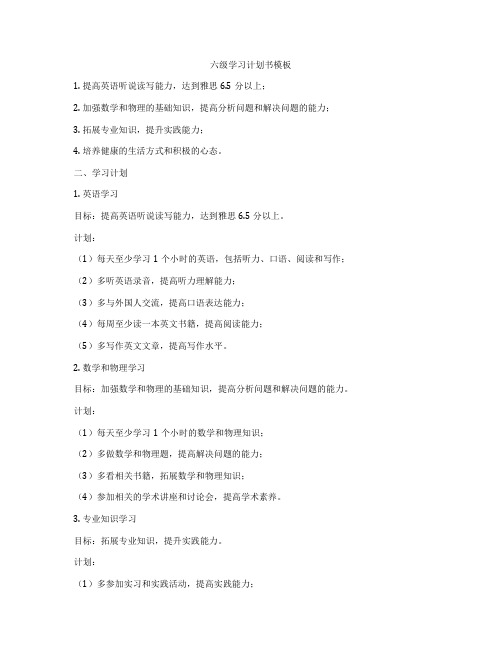
六级学习计划书模板1. 提高英语听说读写能力,达到雅思6.5分以上;2. 加强数学和物理的基础知识,提高分析问题和解决问题的能力;3. 拓展专业知识,提升实践能力;4. 培养健康的生活方式和积极的心态。
二、学习计划1. 英语学习目标:提高英语听说读写能力,达到雅思6.5分以上。
计划:(1)每天至少学习1个小时的英语,包括听力、口语、阅读和写作;(2)多听英语录音,提高听力理解能力;(3)多与外国人交流,提高口语表达能力;(4)每周至少读一本英文书籍,提高阅读能力;(5)多写作英文文章,提高写作水平。
2. 数学和物理学习目标:加强数学和物理的基础知识,提高分析问题和解决问题的能力。
计划:(1)每天至少学习1个小时的数学和物理知识;(2)多做数学和物理题,提高解决问题的能力;(3)多看相关书籍,拓展数学和物理知识;(4)参加相关的学术讲座和讨论会,提高学术素养。
3. 专业知识学习目标:拓展专业知识,提升实践能力。
计划:(1)多参加实习和实践活动,提高实践能力;(2)深入学习专业课程,掌握专业知识;(3)关注行业动态,了解最新技术和发展趋势;(4)多与学长学姐交流,了解行业实情和就业前景。
4. 健康生活学习目标:培养健康的生活方式和积极的心态。
计划:(1)每天坚持运动,保持良好的身体状态;(2)注意饮食结构,保持健康的饮食习惯;(3)多参加社交活动,拓展人际关系;(4)多读书看报,充实自己的思想和知识。
三、学习方法1. 英语学习方法(1)多听多说,提高英语口语表达能力;(2)多读多写,提高英语阅读和写作能力;(3)深入学习英语语法,提高语言准确性;(4)多看英文原版书籍和文章,提高阅读水平。
2. 数学和物理学习方法(1)多做题多练习,提高解题能力;(2)理论联系实际,学以致用;(3)多与同学交流讨论,提高分析问题的能力;(4)带着问题学习,探索更深层次的知识。
3. 专业知识学习方法(1)抓住实习和实践机会,提高实践能力;(2)拓展专业知识,了解行业发展趋势;(3)多参加学术活动,提高专业素养;(4)与老师、同学交流,了解行业最新动态。
英语六级考试学习计划
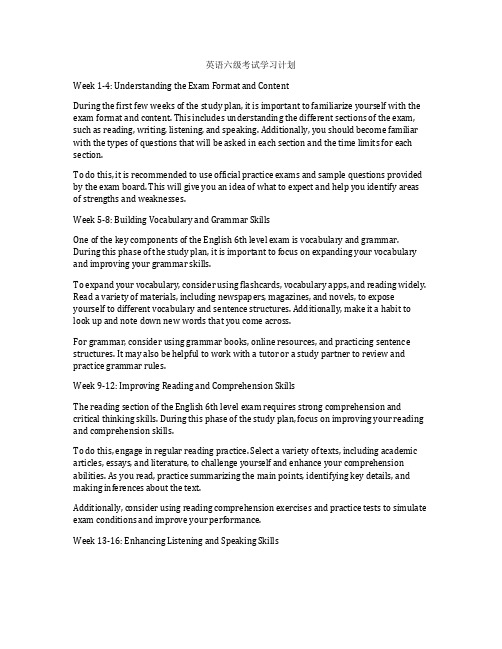
英语六级考试学习计划Week 1-4: Understanding the Exam Format and ContentDuring the first few weeks of the study plan, it is important to familiarize yourself with the exam format and content. This includes understanding the different sections of the exam, such as reading, writing, listening, and speaking. Additionally, you should become familiar with the types of questions that will be asked in each section and the time limits for each section.To do this, it is recommended to use official practice exams and sample questions provided by the exam board. This will give you an idea of what to expect and help you identify areas of strengths and weaknesses.Week 5-8: Building Vocabulary and Grammar SkillsOne of the key components of the English 6th level exam is vocabulary and grammar. During this phase of the study plan, it is important to focus on expanding your vocabulary and improving your grammar skills.To expand your vocabulary, consider using flashcards, vocabulary apps, and reading widely. Read a variety of materials, including newspapers, magazines, and novels, to expose yourself to different vocabulary and sentence structures. Additionally, make it a habit to look up and note down new words that you come across.For grammar, consider using grammar books, online resources, and practicing sentence structures. It may also be helpful to work with a tutor or a study partner to review and practice grammar rules.Week 9-12: Improving Reading and Comprehension SkillsThe reading section of the English 6th level exam requires strong comprehension and critical thinking skills. During this phase of the study plan, focus on improving your reading and comprehension skills.To do this, engage in regular reading practice. Select a variety of texts, including academic articles, essays, and literature, to challenge yourself and enhance your comprehension abilities. As you read, practice summarizing the main points, identifying key details, and making inferences about the text.Additionally, consider using reading comprehension exercises and practice tests to simulate exam conditions and improve your performance.Week 13-16: Enhancing Listening and Speaking SkillsThe listening and speaking sections of the exam require strong listening comprehension and verbal communication skills. During this phase of the study plan, focus on enhancing these skills.To improve listening comprehension, engage in regular listening practice. This may include listening to podcasts, lectures, and other audio materials in English. Focus on identifying main ideas, supporting details, and key points during the listening exercise. Additionally, consider using listening comprehension exercises and practice tests to simulate exam conditions.For speaking skills, consider engaging in regular speaking practice. This may involve participating in English conversation groups, delivering presentations, or practicing speaking exercises with a tutor or study partner. Focus on expressing your ideas clearly and coherently, and work on improving your pronunciation and intonation.Week 17-20: Practice and ReviewIn the final weeks leading up to the exam, focus on practicing and reviewing the material you have studied. This includes taking practice tests, reviewing your answers, and identifying areas of strengths and weaknesses.Additionally, consider seeking feedback from a tutor or study partner to identify any areas of improvement. Use this feedback to guide your review and practice, and focus on strengthening any weak areas.During this time, it may also be helpful to create a study schedule that provides ample time for review and practice. This will allow you to consolidate your knowledge and build confidence before the exam.Overall, studying for the English 6th level exam requires a comprehensive and systematic approach. By following this study plan and dedicating time and effort to each area of the exam, you can effectively prepare and improve your chances of success. Good luck!。
学习计划英语六级
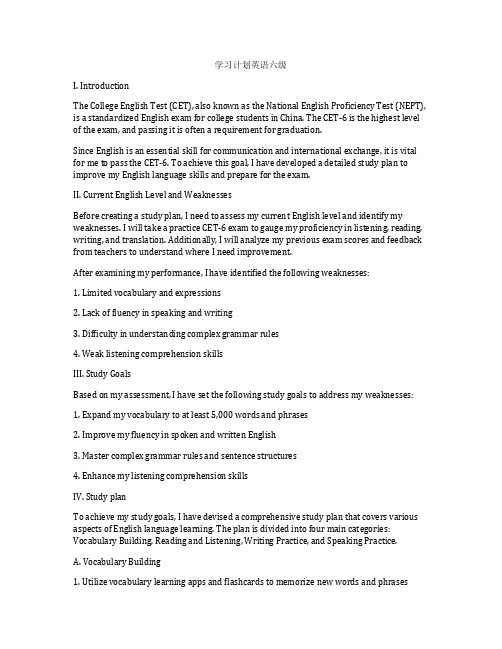
学习计划英语六级I. IntroductionThe College English Test (CET), also known as the National English Proficiency Test (NEPT), is a standardized English exam for college students in China. The CET-6 is the highest level of the exam, and passing it is often a requirement for graduation.Since English is an essential skill for communication and international exchange, it is vital for me to pass the CET-6. To achieve this goal, I have developed a detailed study plan to improve my English language skills and prepare for the exam.II. Current English Level and WeaknessesBefore creating a study plan, I need to assess my current English level and identify my weaknesses. I will take a practice CET-6 exam to gauge my proficiency in listening, reading, writing, and translation. Additionally, I will analyze my previous exam scores and feedback from teachers to understand where I need improvement.After examining my performance, I have identified the following weaknesses:1. Limited vocabulary and expressions2. Lack of fluency in speaking and writing3. Difficulty in understanding complex grammar rules4. Weak listening comprehension skillsIII. Study GoalsBased on my assessment, I have set the following study goals to address my weaknesses:1. Expand my vocabulary to at least 5,000 words and phrases2. Improve my fluency in spoken and written English3. Master complex grammar rules and sentence structures4. Enhance my listening comprehension skillsIV. Study planTo achieve my study goals, I have devised a comprehensive study plan that covers various aspects of English language learning. The plan is divided into four main categories: Vocabulary Building, Reading and Listening, Writing Practice, and Speaking Practice.A. Vocabulary Building1. Utilize vocabulary learning apps and flashcards to memorize new words and phrases2. Engage in daily reading of English newspapers, magazines, and novels to encounter new vocabulary in context3. Participate in vocabulary quizzes and word games to reinforce retention4. Regularly review previously learned words to prevent forgettingB. Reading and Listening1. Read extensively in English literature and non-fiction to improve reading comprehension and vocabulary acquisition2. Listen to English podcasts, radio shows, and speeches to enhance listening skills and exposure to various accents3. Take practice listening tests to reinforce understanding of spoken English4. Summarize and discuss readings and listening materials with peers to strengthen comprehension and critical thinkingC. Writing Practice1. Write daily journal entries in English to improve writing fluency and expression2. Practice writing essays and articles on different topics to develop coherent and structured writing styles3. Seek feedback from teachers and peers on writing assignments to identify areas for improvement4. Study grammar and sentence structure through textbooks and online resources to enhance writing qualityD. Speaking Practice1. Engage in daily English conversations with friends and classmates to improve speaking fluency2. Participate in English speaking clubs and discussion groups to practice expressing opinions and ideas3. Record and listen to my own speech to identify pronunciation and intonation errors4. Seek opportunities to give presentations or speeches in English to build confidence and public speaking skillsV. Study ScheduleTo ensure that I stay on track with my study plan, I have created a detailed schedule that outlines my daily, weekly, and monthly study activities. I have allotted specific time slots foreach category of study (vocabulary, reading/listening, writing, and speaking) and have incorporated regular review sessions to reinforce learning.VI. Evaluation of ProgressTo measure my progress and adjust my study plan accordingly, I will regularly assess my performance using the following methods:1. Take regular practice CET-6 exams to track improvement in scores2. Monitor my vocabulary expansion and comprehension levels through vocabulary quizzes and reading comprehension tests3. Seek feedback from teachers and peers on writing and speaking exercises4. Reflect on my own improvement through self-evaluation and journalingVII. ConclusionBy following this detailed study plan, I am confident that I will be able to significantly improve my English language skills and pass the CET-6 exam with a high score. I am committed to dedicating a substantial amount of time and effort to achieve my study goals and elevate my proficiency in English.I understand that this journey will require perseverance, discipline, and resilience, but I am determined to succeed. With the support of my teachers, peers, and study plan, I am optimistic about the outcome of my CET-6 exam.。
记录英语四六级学习计划
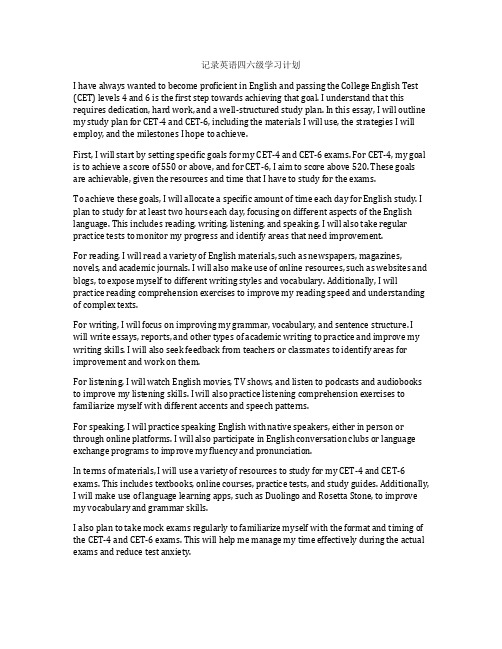
记录英语四六级学习计划I have always wanted to become proficient in English and passing the College English Test (CET) levels 4 and 6 is the first step towards achieving that goal. I understand that this requires dedication, hard work, and a well-structured study plan. In this essay, I will outline my study plan for CET-4 and CET-6, including the materials I will use, the strategies I will employ, and the milestones I hope to achieve.First, I will start by setting specific goals for my CET-4 and CET-6 exams. For CET-4, my goal is to achieve a score of 550 or above, and for CET-6, I aim to score above 520. These goals are achievable, given the resources and time that I have to study for the exams.To achieve these goals, I will allocate a specific amount of time each day for English study. I plan to study for at least two hours each day, focusing on different aspects of the English language. This includes reading, writing, listening, and speaking. I will also take regular practice tests to monitor my progress and identify areas that need improvement.For reading, I will read a variety of English materials, such as newspapers, magazines, novels, and academic journals. I will also make use of online resources, such as websites and blogs, to expose myself to different writing styles and vocabulary. Additionally, I will practice reading comprehension exercises to improve my reading speed and understanding of complex texts.For writing, I will focus on improving my grammar, vocabulary, and sentence structure. I will write essays, reports, and other types of academic writing to practice and improve my writing skills. I will also seek feedback from teachers or classmates to identify areas for improvement and work on them.For listening, I will watch English movies, TV shows, and listen to podcasts and audiobooks to improve my listening skills. I will also practice listening comprehension exercises to familiarize myself with different accents and speech patterns.For speaking, I will practice speaking English with native speakers, either in person or through online platforms. I will also participate in English conversation clubs or language exchange programs to improve my fluency and pronunciation.In terms of materials, I will use a variety of resources to study for my CET-4 and CET-6 exams. This includes textbooks, online courses, practice tests, and study guides. Additionally, I will make use of language learning apps, such as Duolingo and Rosetta Stone, to improve my vocabulary and grammar skills.I also plan to take mock exams regularly to familiarize myself with the format and timing of the CET-4 and CET-6 exams. This will help me manage my time effectively during the actual exams and reduce test anxiety.To track my progress, I will keep a study journal to record my daily study activities, the materials I have covered, and any new vocabulary or grammar rules I have learned. Additionally, I will regularly review my notes and practice tests to reinforce my learning and identify areas for improvement.In terms of milestones, I plan to complete all the study materials at least one month before the exams. This will give me enough time to revise and take additional practice tests to ensure that I am well-prepared for the exams. I will also aim to achieve a specific score on practice tests, such as scoring above 70% on reading comprehension exercises, to gauge my readiness for the exams.In conclusion, passing the CET-4 and CET-6 exams is an important step in achieving my goal of becoming proficient in English. With a well-structured study plan, dedicated study time, and the use of various study materials and resources, I am confident that I can achieve the scores I desire. I am committed to putting in the effort and focus required to pass these exams and to continue improving my English language skills beyond them.。
202届钻石卡英语学习寒假计划——不考数学学员-基础加强阶段(二)[1].doc
![202届钻石卡英语学习寒假计划——不考数学学员-基础加强阶段(二)[1].doc](https://img.taocdn.com/s3/m/60834d2408a1284ac9504332.png)
202届钻石卡英语学习寒假计划——不考数学学员-基础加强阶段(二)[1]202*届钻石卡英语学习寒假计划——不考数学学员-基础加强阶段(二)[1]202*届钻石卡学员考研英语学习计划202*届钻石卡考研英语学习寒假计划-基础加强阶段(二)(不考数学学员专用)寒假是集中学习的时间,因此学员必须充分利用假期为英语学习打好坚实的基础。
本阶段是基础加强阶段,主要任务是夯实英语基础知识,逐渐形成自己特定的学习规律,以便后面的复习能够有条不紊地进行。
用书:《考研英语分级词汇记忆宝典》万学海文名师团队编著对外经济贸易大学出版社《考研英语语法特训手册》万学海文名师团队编著对外经济贸易大学出版社《考研英语基础阅读特训手册》万学海文内部资料《考研英语作文集萃》万学海文内部资料《知识体系精讲讲义》万学海文内部资料计划使用说明:①每个学习任务完成时间是3天,同学们根据自己的时间合理安排每天的学习内容。
②计划里明确了任务量和合理规划,并在备注中注明了学习方法,帮助同学达到预期的学习效果。
③同学们在复习的时候一定要和周围的同学、老师多交流学习心得。
只有自己总结出来的方法才是最适合的学习方法。
1/5202*届钻石卡学员考研英语学习计划具体学习方法指导:单词记忆建议:单词记忆要采用筛选记忆和重点记忆相结合的方法。
每天背单词前,先不看中文词义,筛选出40个不能在第一时间内反应出其核心意思的单词,作为当天的记忆重点。
然后在一天中找出早中晚三个时间段重复记忆;周日将这一周记过的单词再重复一遍。
然后再进入下一周的单词任务。
这样日积月累,记忆压力不会太大,并且效果非常好。
语法学习建议:到现在为止,同学们已经上完了语法课,并学习完了《考研英语语法特训手册》,在寒假,语法学习主要是进行回顾和长难句翻译练习。
建议以语法课程为复习线索,复习课程中老师讲过的知识点,并结合《考研英语语法特训手册》中的相关章节系统复习。
必要时可把平台上的语法课件再听一遍。
- 1、下载文档前请自行甄别文档内容的完整性,平台不提供额外的编辑、内容补充、找答案等附加服务。
- 2、"仅部分预览"的文档,不可在线预览部分如存在完整性等问题,可反馈申请退款(可完整预览的文档不适用该条件!)。
- 3、如文档侵犯您的权益,请联系客服反馈,我们会尽快为您处理(人工客服工作时间:9:00-18:30)。
09届钻石卡学员英语第六期学习计划(不考数学学员使用)
本月是英语基础阶段的最后一月,总体安排是:继续下大力度巩固和积累词汇;背诵英语文章,培养语感,学习各种英语表达;精读文章,培养准确快速的英语阅读能力。
志存高远,脚踏实地,要想考研成功,就必须精度分析每一篇阅读理解的文章,深刻掌握每一个语言知识点,做到每天都有新收获,每日都有小进步,这样才能为以后成绩的迅速提高做好准备。
报名稍晚的学员在安排学习计划的时候,可以根据实际情况,对学习材料合理取舍,适当调整。
本月考试较多,任务量相对较小,个别同学可适当调整。
附:这次发给大家的书比较多,因为个别学校放假时间较长,暑期来领书不是很方便。
领到书的学员不要感觉书太多,压力大。
大家只要按照学习计划有条不紊地进行,一定能够处理好这些资料。
同时,也希望大家不要随意找出哪本书来就做,要按照计划中规定的做题方法来进行,每阶段的侧重点和做题的方式是不一样的,大家切记这一点。
五月份的《专项加强班》推后到六月份,目的是能够使基础班和强化班有一个很好的过渡。
授课老师会把一些学习方法和技巧灵活结合起来为学员讲解,以使学员能够更灵活熟练的运用技巧。
不能来上课的学员可以在网络平台或总部看光盘。
万学·海文
英语教研室
说明:《新编考研英语阅读理解150篇》和《考研英语阅读理解技巧标准全书》俩书近期会发放。
《英语新教程》没有做完的要继续做,前两本书的计划可以后拖,先把《英语新教程》做完。
